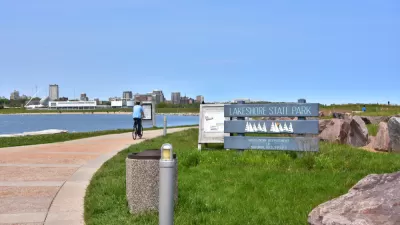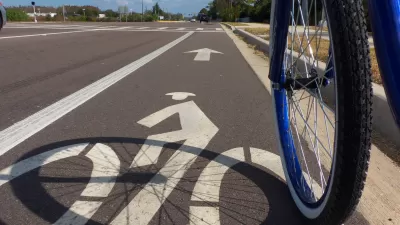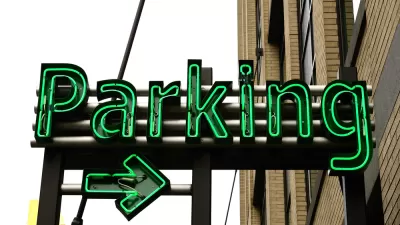A new study released on Friday, coinciding with National Bike to Work Day, finds that bicyclists in the United States save at least $4.6 billion a year by riding instead of driving, reports Tanya Mohn.
With the dramatic rise in bicycling commuters over the past decade (40%) and the outsized percentage of household budgets spent on transportation (more than food or healthcare), the economic benefits of bicycling announced last week by the League of American Bicyclists, Sierra Club, and the National Council of La Raza are destined to raise a few eyebrows.
According to Mohn, "The average annual operating cost of a bicycle is $308, compared to $8,220 for the average car, and if American
drivers replaced just one four-mile car trip with a bike each week for
the entire year, it would save more than two billion gallons of gas, for
a total savings of $7.3 billion a year, based on $4 a gallon for gas."
"Making it easier and safer for people to walk or bicycle 'is a matter of fairness,' Transportation Secretary Ray LaHood
wrote on his blog Fast Lane on Friday...LaHood noted that walking and bicycling are options people want,
citing a national poll released by Princeton Survey Research Associates International
in March that indicated that 'more than 80 percent of Americans support
maintaining or increasing federal funding for biking and walking.' 'The
benefits of bicycling are real, and there's no arguing with the
impressive ridership data,' LaHood said. 'Bicycling is an important part of the 21st century transportation mix.'"
FULL STORY: Pedaling to Prosperity: Biking Saves U.S. Riders Billions A Year

Alabama: Trump Terminates Settlements for Black Communities Harmed By Raw Sewage
Trump deemed the landmark civil rights agreement “illegal DEI and environmental justice policy.”

Planetizen Federal Action Tracker
A weekly monitor of how Trump’s orders and actions are impacting planners and planning in America.

Why Should We Subsidize Public Transportation?
Many public transit agencies face financial stress due to rising costs, declining fare revenue, and declining subsidies. Transit advocates must provide a strong business case for increasing public transit funding.

‘Clybourne Park’ Sets Stage for Housing Equity Discussions
Clybourne Park, a play exploring race, real estate, and community tensions, can set the stage for discussion on the lasting impacts of housing discrimination, gentrification, and the fight for affordability.

Understanding Road Diets
An explainer from Momentum highlights the advantages of reducing vehicle lanes in favor of more bike, transit, and pedestrian infrastructure.

New California Law Regulates Warehouse Pollution
A new law tightens building and emissions regulations for large distribution warehouses to mitigate air pollution and traffic in surrounding communities.
Urban Design for Planners 1: Software Tools
This six-course series explores essential urban design concepts using open source software and equips planners with the tools they need to participate fully in the urban design process.
Planning for Universal Design
Learn the tools for implementing Universal Design in planning regulations.
Caltrans
Smith Gee Studio
Institute for Housing and Urban Development Studies (IHS)
City of Grandview
Harvard GSD Executive Education
Toledo-Lucas County Plan Commissions
Salt Lake City
NYU Wagner Graduate School of Public Service





























